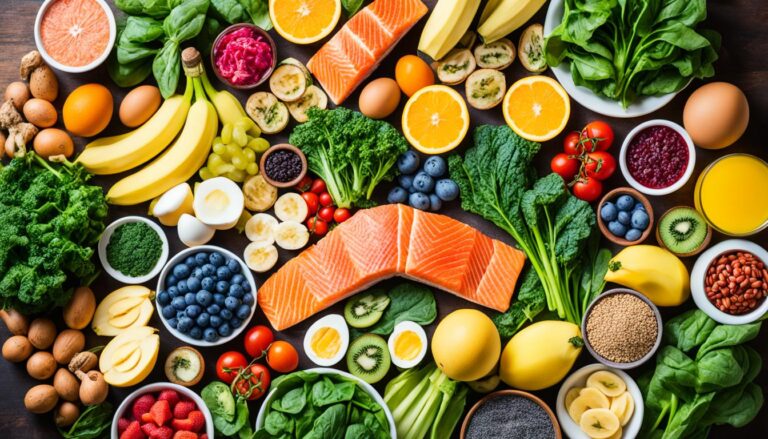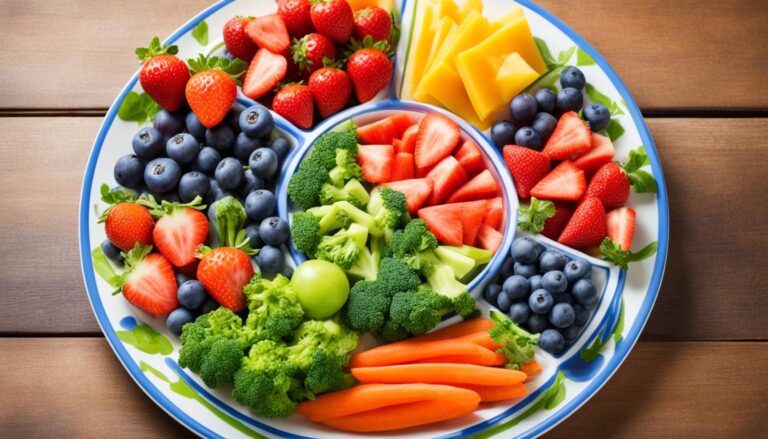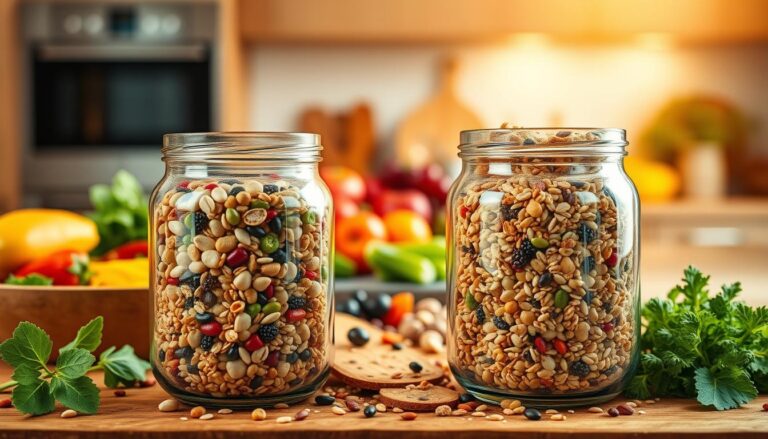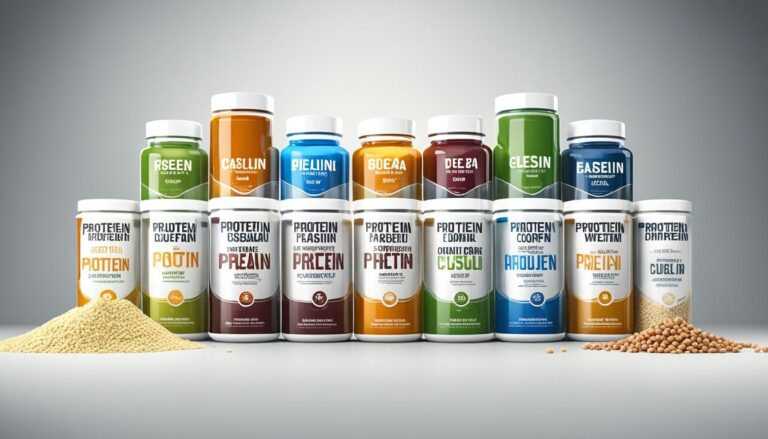Feeling bloated slow or having trouble with bowel movements? These signs might mean your body needs more fiber. Fiber is key for a healthy diet.
It helps with digestion keeps things regular and boosts overall health. But how do you know if you should take fiber supplements? Let’s look at seven signs that show it’s time to add more fiber to your diet.
Key Takeaways
- Dietary fiber is essential for digestive health and regularity.
- Symptoms like bloating, sluggishness, and irregular bowel movements may signal a fiber deficiency.
- Identifying the right fiber supplements can help address these issues and support overall gut wellness.
- A balanced intake of soluble and insoluble fiber is crucial for maintaining a healthy digestive system.
- Incorporating more fiber-rich foods and supplements can unlock a world of benefits for your body and mind.
Exploring the Wondrous World of Fiber
Dive into the world of dietary fiber, a key part of our diets. It’s vital for a healthy gut and overall health. Fiber is a type of carb our bodies can’t digest. It comes in two forms: soluble and insoluble fiber. Each type has its own benefits, working together to keep our digestive systems balanced.
Unraveling the Mysteries of Dietary Fiber
Soluble fiber dissolves in water and slows down nutrient absorption. This helps control blood sugar and cholesterol levels. Insoluble fiber adds bulk to stool helping waste move through the digestive system and ensuring regular bowel movements. These two fibers work together to support gut health and overall health.
Soluble vs. Insoluble Fiber A Delicate Balance
Finding the right balance between soluble and insoluble fiber is key for gut health. Eating a diet rich in plant-based foods gives you the right mix of these fibers.
This ensures your digestive system works well. Whether you want to boost gut wellness or try prebiotic supplements, knowing about dietary fiber is important for a healthier life.

Fiber is the unsung hero of a healthy gut, playing a vital role in maintaining regularity supporting gut flora, and promoting overall well being.
The Craving for Roughage A Tale of Constipation
Do you often feel like you need more fiber in your meals? If so, it might be a sign that you’re dealing with constipation. Fiber helps soften your stool and keeps your bowel movements regular. If you’re having trouble with bowel movements it’s likely your body is telling you to eat more fiber.
Constipation can be uncomfortable and frustrating. It can make you feel bloated and upset. But there’s good news eating more fiber can help. Bulk forming laxatives which are fiber supplements can make your stool softer and help you go to the bathroom more regularly.
If you have ongoing intestinal disorders or constipation you should talk to a doctor. They can figure out what’s causing it and suggest the best treatment. This might include changing your diet or taking fiber supplements.
Eating a high-fiber diet is good for your gut and overall health. It can help you overcome constipation. So why not try it and see how it makes you feel?
| Fiber Type | Benefits |
|---|---|
| Soluble Fiber | Helps to regulate bowel movements and can lower cholesterol levels. |
| Insoluble Fiber | Promotes digestive health and can help to prevent constipation. |

Fiber is the unsung hero of digestive health. It’s time to give it the recognition it deserves!
Adding more fiber rich foods to your meals or taking fiber supplements can ease constipation symptoms. It can also help with bowel regularity. Don’t let constipation slow you down. Embrace the power of roughage for a healthier, fiber-filled life.
Bloating and Discomfort Fiber to the Rescue!
Feeling bloated and uncomfortable can really ruin your day. But there’s a simple solution – fiber. Soluble fiber is especially great at easing these digestive issues.
Beating the Bloat with Fiber’s Superpowers
When our digestive system is off balance, we can feel bloated. Soluble fiber helps by soaking up extra fluid and moving waste through our gut smoothly. This reduces gas and makes digestion more comfortable.
Studies prove that eating more fiber, especially soluble fiber, helps with bloating and other digestive health problems. Adding more high-fiber foods or fiber supplements can support your gut wellness.
Fiber is like a superhero for your digestive system, helping to regulate and soothe the gut in times of discomfort. Nutritionist Jane Doe

If you’re dealing with ongoing bloating or discomfort try fiber. It’s a natural way to balance and soothe your digestive health.
7 Signs That You May Need Fiber Supplements
Keeping your digestive health in check is key to feeling good overall. Fiber is a big part of that. If you’re dealing with constipation, bloating, or irregular bowel movements, you might need more fiber supplements. Here are seven signs your body might be asking for more fiber:
- Sluggish Digestion: Feeling tired, sluggish, or lacking energy could mean your digestive health isn’t great. Getting enough fiber can help keep your bowels regular and boost your energy.
- Persistent Constipation: If you’re always constipated, your body might not have enough dietary fiber. Fiber supplements can help fix this and make your bowel movements regular again.
- Bloating and Gas: Often feeling bloated or gassy could mean your gut isn’t breaking down food well. Fiber can ease these problems by supporting healthy digestion.
- Difficulty Maintaining a Healthy Weight: Fiber is key for managing weight by making you feel full and supporting your gut health. Struggling to keep a healthy weight? Trying a high-fiber diet or fiber supplements might help.
- Lack of Mental Clarity: Your gut health affects your brain too. Not getting enough fiber can make you feel foggy or tired.
- Changes in Gut Health: Noticing changes in your stool or gut health could mean you need more dietary fiber. Prebiotic supplements can feed the good bacteria in your gut.
- Irregular Bowel Movements: If your bowel movements are not regular, your body might be lacking fiber. This can help regulate your digestive system and make bowel movements more regular.
If you’re seeing any of these signs, it might be time to add fiber supplements to your daily routine. A balanced high-fiber diet and the right prebiotic supplements can greatly improve your digestive health and gut wellness.

Irregular Bowel Movements: Fiber’s Call to Action
Irregular bowel movements can be tough and uncomfortable. But, fiber can be a gentle solution. Adding more fiber-rich foods to your diet can help your digestive system work better. This can lead to the regular bowel movements you want.
Restoring Regularity with Fiber’s Gentle Touch
Fiber acts as a natural laxative that softens stool and helps with regular bowel movements. It’s great for both occasional constipation and ongoing intestinal issues. A diet high in fiber can be your key to regularity.
Soluble fiber, found in oats, beans, and berries, absorbs water and makes stool bulkier. This makes it easier to pass. Insoluble fiber, in whole grains and veggies, helps move waste through your intestines. Both types support your bowel health.
Adding high-fiber foods to your meals can feed your gut and help with regular, easy bowel movements. Let fiber’s power help you say goodbye to irregular bowel habits.
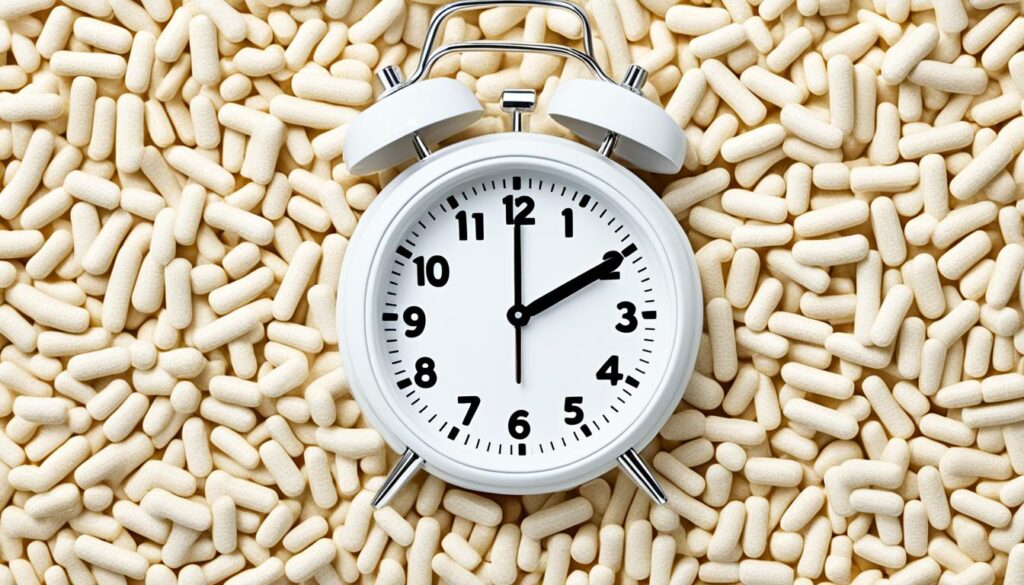
Fiber is the unsung hero of digestive health, gently guiding your body towards the regularity it deserves.
The Gut Brain Connection Fiber’s Role in Mental Clarity
Research shows a deep link between gut health and brain function. Fiber is key in a healthy diet. It helps keep the gut microbiome balanced, which boosts mental clarity focus, and mood.
Fiber found in plant based foods feeds the good bacteria in your gut. This relationship is crucial for good digestion and gut health. The gut-brain axis lets the gut microbiome affect the brain and mental processes.
Fiber is not just important for regular bowel movements it’s also crucial for supporting a healthy gut microbiome which can have far reaching effects on our mental clarity and cognitive performance.
Eating a diet high in fiber from whole grains fruits, veggies, and legumes keeps the gut microbiome diverse and healthy. This diversity is linked to better mental clarity and fewer mood issues. On the other hand low fiber intake can harm gut flora, leading to cognitive and mental health problems.
Adding more fiber-rich foods to your diet supports your gut-brain connection. This can unlock your mental potential. Start enjoying the benefits of fiber for a clearer, healthier mind.

Prebiotic Power Feeding Your Friendly Gut Flora
Fiber is a key player in gut health. It helps with digestion and feeling full. But it also feeds the good bacteria in your gut. These bacteria, called probiotics, are vital for a healthy gut. Fiber is their main food source, making it a prebiotic powerhouse.
Unleashing the Benefits of Probiotic-Prebiotic Synergy
Eating foods high in prebiotic supplements and high fiber foods helps your body and gut bacteria. Soluble and insoluble fiber in your diet feed these good bacteria. This relationship between probiotics and prebiotics boosts gut health.
- Prebiotics, like those in high-fiber diet foods, feed probiotics, helping them grow and work better.
- Probiotics break down and ferment prebiotics, releasing nutrients that support gut health.
- This synergy leads to a balanced gut microbiome, which is good for digestion and immune health.
Fiber is the unsung hero of gut wellness nourishing the hidden heroes our friendly gut bacteria and unlocking a world of health benefits.
To boost your gut health, eat more prebiotic supplements and fiber-rich foods. Your body and gut will appreciate it.
Unlocking Weight Management with Fiber’s Magic
Fiber is more than just a gut helper; it’s key for weight management. Soluble fiber slows down nutrient absorption. This makes you feel full and satisfied. It helps control cravings and stops overeating, making it great for staying at a healthy weight.
Fiber does even more. A healthy gut wellness is linked to good weight control. Fiber feeds the good bacteria in your gut. This helps with metabolism and appetite control. A high-fiber diet boosts your body’s ability to manage weight.
Incorporating more fiber into your diet is a simple yet powerful strategy for achieving your weight management goals.
Looking to lose weight, keep a healthy weight, or just feel better? Adding fiber to your diet is a smart move. Eating fiber-rich foods regularly opens up new ways to manage weight. It also helps you focus on gut wellness.
| Fiber Type | Benefits for Weight Management |
|---|---|
| Soluble Fiber | Slows nutrient absorption, promotes feelings of fullness and satisfaction |
| Insoluble Fiber | Supports healthy gut microbiome, regulates metabolism and appetite |
Fiber Rich Foods Nature’s Bounty of Goodness
Fiber supplements can be useful, but eating a variety of whole foods is key. These foods give you essential nutrients and many health benefits. They help with digestion and can aid in weight control.
Here are some top foods high in fiber that should be in your diet:
- Fruits: Fruits like berries pears apples and oranges are full of soluble fiber. They’re great for your daily meals.
- Vegetables: Leafy greens broccoli artichokes, and brussels sprouts offer both soluble and insoluble fiber.
- Whole Grains: Choose whole wheat bread, brown rice, quinoa, and oats to increase your fiber.
- Legumes: Beans, lentils, and chickpeas are packed with fiber. They make meals more satisfying and nutritious.
- Nuts and Seeds Almonds walnuts chia seeds, and flaxseeds are fiber-rich snacks that fit easily into your day.
By eating a variety of fiber-rich foods, you make sure your body gets the right mix of soluble and insoluble fiber. Embrace the natural goodness of these foods for a fiber-filled life!
| Food | Fiber Content per serving |
|---|---|
| Raspberries 1 cup | 8 g |
| Lentils 1 cup, cooked | 15 g |
| Oats 1 cup, cooked | 4 g |
| Broccoli 1 cup, raw | 2.4 g |
| Almonds 1 ounce | 3.5 g |
Fiber is the unsung hero of the nutrient world, quietly working behind the scenes to support our overall health and well-being.
Conclusion Embracing the Fiber Full Life
Dietary fiber is amazing and crucial for our health. It helps us stay healthy and supports our digestive health. By knowing when we need more fiber, we can take steps to feel better.
Adding more fiber-rich foods and prebiotic supplements can help. This can ease constipation, reduce bloating, and boost mental clarity. Fiber is a key ally for a healthier life.
Let’s embrace the fiber-full life and see how it changes us. By focusing on dietary fiber we can improve our bowel regularity, manage our weight better, and connect our gut and brain more deeply. Starting with fiber is the first step to a happier, healthier life.
